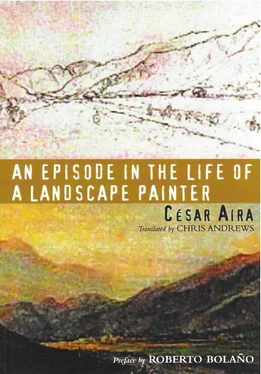Cesar Aira - An Episode in the Life of a Landscape Painter
Здесь есть возможность читать онлайн «Cesar Aira - An Episode in the Life of a Landscape Painter» весь текст электронной книги совершенно бесплатно (целиком полную версию без сокращений). В некоторых случаях можно слушать аудио, скачать через торрент в формате fb2 и присутствует краткое содержание. Год выпуска: 2006, Издательство: New Directions, Жанр: Современная проза, на английском языке. Описание произведения, (предисловие) а так же отзывы посетителей доступны на портале библиотеки ЛибКат.
- Название:An Episode in the Life of a Landscape Painter
- Автор:
- Издательство:New Directions
- Жанр:
- Год:2006
- ISBN:нет данных
- Рейтинг книги:5 / 5. Голосов: 1
-
Избранное:Добавить в избранное
- Отзывы:
-
Ваша оценка:
- 100
- 1
- 2
- 3
- 4
- 5
An Episode in the Life of a Landscape Painter: краткое содержание, описание и аннотация
Предлагаем к чтению аннотацию, описание, краткое содержание или предисловие (зависит от того, что написал сам автор книги «An Episode in the Life of a Landscape Painter»). Если вы не нашли необходимую информацию о книге — напишите в комментариях, мы постараемся отыскать её.
An Episode in the Life of a Landscape Painter
An Episode in the Life of a Landscape Painter — читать онлайн бесплатно полную книгу (весь текст) целиком
Ниже представлен текст книги, разбитый по страницам. Система сохранения места последней прочитанной страницы, позволяет с удобством читать онлайн бесплатно книгу «An Episode in the Life of a Landscape Painter», без необходимости каждый раз заново искать на чём Вы остановились. Поставьте закладку, и сможете в любой момент перейти на страницу, на которой закончили чтение.
Интервал:
Закладка:
Although in their letters the Guttikers kept urging him to return to Chile, the journey across the mountains was repeatedly postponed. He was engrossed in the work of letter-writing and still apprehensive about confronting acquaintances with his new face, while the need for medical attention had become less urgent, partly because his torments had settled into a more or less stable pattern and partly because he was beginning to accept the futility of any treatment. But the preponderant reason for the delay was that conditions in Mendoza at that time of year were ideal for painting. And this, in turn, encouraged the two friends to extend their excursions, in so far as Rugendas's health permitted, always venturing southwards, towards the forests and lakes, where, despite the cold, a mysterious tropical zone of blue light and endless foliage seemed to begin. They would spend the night in San Rafael, a little village ten leagues south of the provincial capital, or at one of the ranches in the area belonging to friends or relatives of the Godoys, and then set off, sometimes for whole days at a time, up winding valleys, in search of views, which they captured in increasingly strange watercolors. After a few such exquisite outings, they could not bear to give them up. The vagueness of the letters Rugendas wrote during those weeks has allowed a legend to spring up, according to which he journeyed far into the south, to regions unexplored by white men, perhaps all the way to the fabled glaciers, shifting mountains of ice, impregnable portals of another world. The field sketches dating from that time lend credence to the myth. They have an air of impossible distance about them. For the legend to be true, Rugendas would have had to fly through the air, like an Immortal, from the known to the unknown. Which is what he was doing all the time, mentally. But for him it was a normal, everyday activity, a mere background for incredible events, anecdotes or episodes.
Whatever the truth of the matter, the Germans found themselves in natural surroundings that were excitingly unfamiliar, so unfamiliar that Rugendas required confirmation from his friend that what he was seeing existed objectively and was not a product of his altered state. Urgent, impertinent birds flung outlandish cries in the tangled vegetation, guinea fowl and hairy rats scampered away before them, powerful yellow pumas kept watch from rock ledges. And the condor soared pensively over the abysses. There were abysses within abysses and trees rose like towers from the deep underground levels. They saw gaudy flowers open, large and small, some with paws, others with rounded kidneys of apple flesh. In the streams there were sirenlike molluscs and, at the bottom, always swimming against the current, legions of pink salmon the size of lambs. The deep green of the auraucaria trees thickened to a velvety black or parted to reveal floating landscapes that always seemed upside down. Around the lakes, forests of delicate myrtle, with trunks like tubes of yellow rubber, smooth to the touch and cold as ice. Moss plumped up to form wilderness sofas; the airy lacework of fern fronds quivered nervously.
And then one day they remembered: when the Indians mounted their deadly, lightning raids, it was from those zones that they emerged. It would not have surprised them to learn that they appeared from thin air. But obviously they came from a place on earth, somewhere further away, who knows where, and the forests flanking the Cordillera provided them with handy passages for making quick incursions into civilization and equally quick getaways.
They were reminded of these events, which had greatly exercised Rugendas's imagination before the accident, not by an association of ideas, but by reality itself, in the most abrupt manner. They had spent the night at a ranch near San Rafael, after three days of camping at high altitude amid Edenic greenery. During the descent they had decided to go straight back to Mendoza, but then they stopped to paint and had to spend the night at the ranch house, whose owner was coming to the end of his summer stay on the property and preparing to return to town, where his children went to school. Rugendas, who was going through a particularly critical phase, had attacks of vertigo and cerebral short-circuiting all night; he could only withstand them by taking an excessive dose of morphine, and dawn found him sleepwalking, covered in sweat, his face a jig of lightning tics, his pupils shrunk to pinpoints as if he were at the center of the sun.
And when the sun rose the yard began to resound with shouts and the noise of horses.
Indians! Indians! What?
Indians! Indians!
The household swung into action in an instant; it sounded as if all its occupants were hurling themselves against the walls like raving lunatics. The two friends came to the door of their room, which opened onto a gallery around the yard. Krause intended to find out what was happening, how serious the disturbance was and if there was any possibility of setting out for Mendoza, while his friend went back to bed; but Rugendas came out after him, half-dressed and staggering. Krause could have stood on his authority and sent him back, but it was not worth the trouble: in the confusion, no one would pay any attention to the monsters somnolent bumbling, and besides there was no time to lose. So he let him reel freely.
The men were organizing the defense. It was not the first time they had taken up arms to drive the Indians back, nor would it be the last, and their manner was relaxed. It was simply part of the job. But the customary nature of the occurrence had not led to improved organization; how could the response be organized when the raids were so erratic and unpredictable? With a bare minimum of information they improvised a counter-attack, as swift as possible, and combined, as best they could, with an emergency roundup, because the main aim was to limit the losses of livestock.
According to a messenger, the attack had begun at dawn with a massacre at the post office, and spread from there as the Indians went rustling cattle all around the area. They could not have advanced much further and mounted parties were already setting out in pursuit from the surrounding ranches. The number of Indians was estimated at one thousand; it was a medium-to-large raid.
A contingent of farmhands would remain at the ranch house to defend the women and children; the house, as the owner told Krause, could be transformed into a fort using simple panels, which were already being put into place. He asked what the Germans were intending to do; they could be useful either way, going along or staying behind.
This conversation, interrupted by shouts and orders (and energetic gestures), took place in the middle of the yard, where the men were already gathering with their guns. Krause, still half asleep, was of two minds, and went back to see if his friend had returned to the room… but no, there he was, using a hat to cover his face, still as a tree. He gave a violent start when Krause took him by the arm. Asked if he had heard the news, he mumbled indistinctly in reply… No, he had clearly neither heard nor understood what was happening. Krause decided immediately to put him back to bed and stay to help with the defense of the house, if it came to that. He could not help feeling a twinge of regret: they had cherished the dream of seeing the Indians in action, and now their chance had come, but they would have to miss it. While the ranch owner and his men made a noisy exit through the gates, Krause took his friend's arm and started leading him back to the house. To stop him falling in the other direction, he had to guide him from behind, gripping both arms and holding him up. Rugendas walked stiffly but all the parts of his body seemed to be working loose. He went on mumbling, and since Krause was ignoring him, raised his voice to a shout. They were already back in the gallery. Krause came around to face him, and, rather embarrassed, asked what he was saying. It was something about a mantilla. Krause opened the door of the room and Rugendas darted in, went straight to his painting kit, and pointed to his friend's. Krause could not believe his eyes, but he had to bow to the evidence: in spite of the state he was in, the great Rugendas wanted to go and sketch the Indian raid. Krause sat down on the bed disconsolately. It's impossible, impossible, he said. Rugendas paid no attention. He had realized he was barefoot and begun the laborious business of putting on his boots. He looked up at Krause: The horses, he said. Krause tried a dissuasive argument that had just occurred to him: they could sleep for a couple of hours and leave around midday. The action was bound to continue into the afternoon. But Rugendas was not listening; he was in another dimension. His movements had transformed the room into a mad scientist's laboratory where some transformation of the world was being hatched. The nocturnal half-light gave the interior a Flemish touch. Like a purple-faced lion he fumbled with his boots, on all fours. Krause rushed out, heading for the stables, pursued by the stammering of his half-shod friend: Man! Manti! Mantilla! They would take only Flash and the bay horse, Dash. It would not have to be more than an outing, after all, a painters picnic; and perhaps the ride and the activity would help to clear Rugendas's mind. He had probably overexerted himself during the previous days, because of the abundance of beauty they had encountered. The raid had come at a bad time, and yet it could still serve a purpose: to exhaust the painter's energy, or rather, to complete that process; given his current state the only hope of improvement lay in plumbing the depths.
Читать дальшеИнтервал:
Закладка:
Похожие книги на «An Episode in the Life of a Landscape Painter»
Представляем Вашему вниманию похожие книги на «An Episode in the Life of a Landscape Painter» списком для выбора. Мы отобрали схожую по названию и смыслу литературу в надежде предоставить читателям больше вариантов отыскать новые, интересные, ещё непрочитанные произведения.
Обсуждение, отзывы о книге «An Episode in the Life of a Landscape Painter» и просто собственные мнения читателей. Оставьте ваши комментарии, напишите, что Вы думаете о произведении, его смысле или главных героях. Укажите что конкретно понравилось, а что нет, и почему Вы так считаете.












